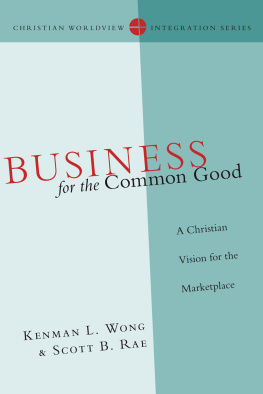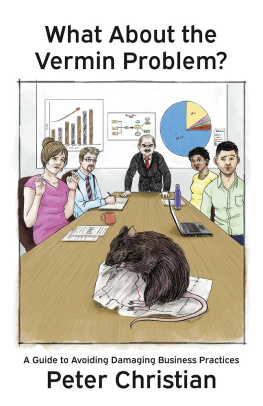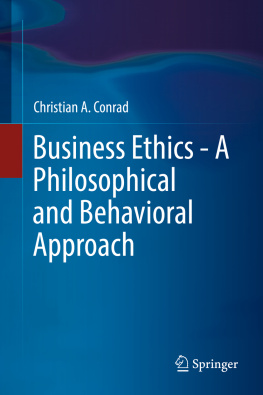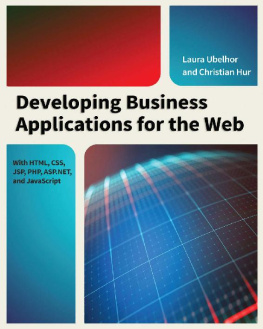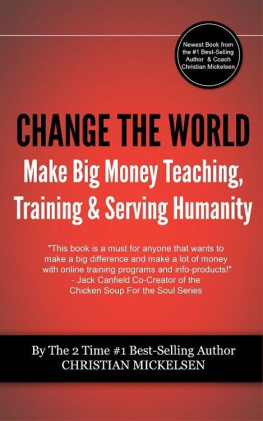
BUSINESS
for the Common Good
A Christian
Vision for the
Marketplace
KENMAN L. WONG
& SCOTT B. RAE
InterVarsity Press
P.O. Box 1400, Downers Grove, IL 60515-1426
World Wide Web: www.ivpress.com
Email:
2011 by Kenman L. Wong and Scott B. Rae
All rights reserved. No part of this book may be reproduced in any form without written permission from InterVarsity Press.
InterVarsity Press is the book-publishing division of InterVarsity Christian Fellowship/USA, a movement of students and faculty active on campus at hundreds of universities, colleges and schools of nursing in the United Statesof America, and a member movement of the International Fellowship of Evangelical Students. For information about local and regional activities, write Public Relations Dept., InterVarsity Christian Fellowship/USA, 6400 Schroeder Rd., P.O. Box 7895, Madison, WI 53707-7895, or visit the IVCF website at .
All Scripture quotations, unless otherwise indicated, are taken from the Holy Bible, New International Version. niv. Copyright 1973, 1978, 1984 by International Bible Society. Used by permission of Zondervan Publishing House. All rights reserved.
Design: Cindy Kiple
ISBN 978-0-8308-6841-4 (digital)
ISBN 978-0-8308-2816-6 (print)
This digital document has been produced by Nord Compo.
SERIES PREFACE
A CALL TO INTEGRATION AND THE
CHRISTIAN WORLDVIEW INTEGRATION SERIES
L ifes short and were all busy. If youre a college student, youre really busy. Theres your part-time job (which seems full time), your social life (hopefully) and church. On top of that youre expected to go to class, do some reading, take tests and write papers. Now, while you are minding your own business, you hear about something called integration, trying to relate your major with your Christianity. Several questions may come to mind: What is integration, anyway? Is it just a fad? Why should I care about it? And even if I do care about it, I dont have a clue as to how to go about doing it. How do I do this? These are good questions, and in this introduction were going to address them in order. We are passionate about helping you learn about and become good at integrating your Christian convictions with the issues and ideas in your college major or your career.
WHAT IS INTEGRATION?
The word integrate means to form or blend into a whole, to unite. We humans naturally seek to find the unity that is behind diversity, and in fact coherence is an important mark of rationality. There are two kinds of integration: conceptual and personal. In conceptual integration, our theological beliefs, especially those derived from careful study of the Bible, are blended and unified with important, reasonable ideas from our profession or college major into a coherent, intellectually satisfying Christian worldview. As Augustine wisely advised, We must show our Scriptures not to be in conflict with whatever [our critics] can demonstrate about the nature of things from In personal integration we seek to live a unified life, a life in which we are the same in public as we are in private, a life in which the various aspects of our personality are consistent with each other and conducive to a life of human flourishing as a disciple of Jesus.
The two kinds of integration are deeply intertwined. All things being equal, the more authentic we are, the more integrity we have, the more we should be able to do conceptual integration with fidelity to Jesus and Scripture, and with intellectual honesty. All things being equal the more conceptual integration we accomplish, the more coherent will be our set of beliefs and the more confidence we will have in the truth of our Christian worldview. In fact, conceptual integration is so important that it is worth thinking some more about why it matters.
SEVEN REASONS WHY INTEGRATION MATTERS
1. The Bibles teachings are true. The first justification for integration is pretty obvious, but often overlooked. Christians hold that, when properly interpreted, the teachings of Holy Scripture are true. This means two things. If the Bible teaches something relevant to an issue in an academic field, the Bibles view on that topic is true and thus provides an incredibly rich resource for doing work in that academic field. It would be irresponsible to set aside an important source of relevant truth in thinking through issues in our field of study or vocation. Further, if it looks like a claim on our field tends to make a biblical claim false, this tension needs to be resolved. Maybe our interpretation of Scripture is mistaken, maybe the Bible is not even talking about the issue, maybe the claim in our field is false. Whatever the case, the Christians commitment to the truth of Scripture makes integration inevitable.
Adolfo Lopez-Otero, a Stanford engineering professor and a selfdescribed secular humanist, offers advice to thinking Christians who want to have an impact on the world: When a Christian professor approaches a non-believing faculty member they can expect to face apolite but condescending person [with a belief that they possess] superior metaphysics who cant understand how such an intelligent person [as While Lopez-Oteros remarks are directed to Christian professors, his point applies to all thinking Christians: If we claim that our Christian views are true, we need to back that up by interacting with the various ideas that come from different academic disciplines. In short, we must integrate Christianity and our major or vocation.
2. Our vocation and the holistic character of discipleship demand integration. As disciples grow, they learn to see, feel, think, desire, believe and behave the way Jesus does in a manner fitting to the kingdom of God and their own station in life. With Gods help we seek to live as Jesus would if he were a philosophy professor at Biola University married to Hope and father of Ashley and Allison, or as a political philosopher at Baylor University married to Frankie.
Two important implications flow from the nature of discipleship. For one thing the lordship of Christ is holistic. The religious life is not a special compartment in an otherwise secular life. Rather, the religious life is an entire way of life. To live Christianly is to allow Jesus Christ to be the Lord of every aspect of our life. There is no room for a secular-sacred separation in the life of Jesus followers. Jesus Christ should be every bit as much at home in our thinking and behavior when we are developing our views in our area of study or work as he is when we are in a small group fellowship.
Further, as disciples of Jesus we do not merely have a job. We have a vocation as a Christian teacher. A job is a means for supporting ourselves and those for whom we are responsible. For the Christian a vocation (from the Latin vocare, which means to call) is an overall calling from God. Harry Blamires correctly draws a distinction between a general and a special vocation:
The general vocation of all Christiansindeed of all men and womenis the same. We are called to live as children of God, obeying his will in all things.
As Christians seek to discover and become excellent in their special vocation, they must ask: How would Jesus approach the task of being a history teacher, a chemist, an athletic director, a mathematician? It is not always easy to answer this question, but the vocational demands of discipleship require that we give it our best shot.

